Do you suffer from joint inflammation and burning pain in your big toe? Gout, a form of arthritis, could be the cause of your suffering.
Gout 101
Gout is a type of inflammatory arthritis that occurs when your body no longer excretes uric acid as it should. As a consequence, the uric acid collects in your bloodstream.
Although gout can occur anywhere, it usually affects the big toes first because uric acid crystals form at lower temperatures. Since the big toe is the farthest from the heart, it’s one of the coolest parts of your body.
Two-thirds of the uric acid created by your body is a waste product of digestion, but your body creates more uric acid in the presence of fructose and purine.
Uric acid isn’t harmful in small amounts. In fact, uric acid is a powerful antioxidant, but it can become problematic when there’s too much of it in the bloodstream.
Because the kidneys are the organs responsible for controlling the amount of uric acid your body excretes, anything that harms your kidneys may have a negative impact on your gout.
Symptoms of gout include the following:
- Sudden pain in the big toe
- Swelling of the joints
- Tenderness
- Redness
Gout usually flares up at night and begins with intense pain that may last up to 12 hours.
Once the flare-up dissipates, you may experience lingering inflammation, discomfort, and redness that can last anywhere from a few days to a few weeks. Your toe may feel stiff, and as the disease advances, you can lose range of motion in your joints.
Gout risk factors
You may be at an increased risk for gout if you:
- Are overweight or obese
- Have kidney disease
- Have insulin resistance or diabetes
- Consume alcohol on a regular basis
- Eat a high fructose diet
- Have a family history of gout
- Take diuretics or aspirin on a regular basis
Your body also produces uric acid when it breaks down purines. Although the majority of the purine in your body is created as a result of digestion, a small amount may come from dietary sources such as certain types of seafood, alcoholic drinks, and drinks sweetened with fructose.
Gout is often referred to as the “disease of the kings.” Henry VIII — who had a love for fruit pies, custards, puddings, and game meat — suffered from gout.
Prevention tips
When you first come to Bay Area Foot Care with gout symptoms, our staff conducts a thorough examination to determine the best course of treatment.
Gout may be linked to other underlying conditions that decrease the rate at which uric acid is excreted, or it may be linked to your diet. Bring a list of all of the medications you take, as some medications can slow down the rate at which uric acid is excreted.
To prevent flare-ups, consider taking the following steps:
- Reduce your seafood and poultry consumption
- Reduce your fructose consumption
- Opt for home-cooked meals prepared from whole ingredients
- Reduce your intake of trans fat

